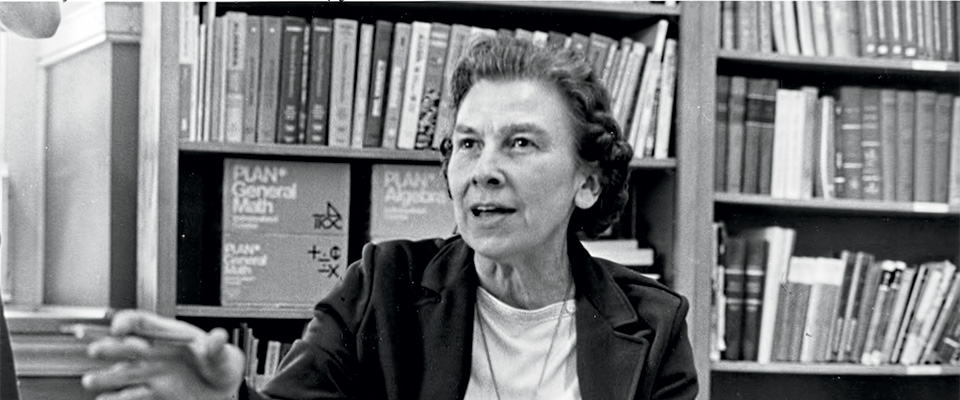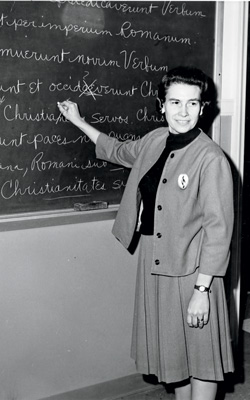Ahead of the Class

By Kathleen Parrish
To those who knew her, Clay Ketcham was “feisty,” “a force to be reckoned with,” and “far ahead of her times.”
The first female professor at Lafayette, and the namesake of the newly renovated faculty and staff dining room in Marquis Hall, Ketcham arrived at the then all-men’s college in 1954 and established the reading and study program. When she retired 45 years later as head of the college’s Department of Education, she was regarded as a guru in the field of competency-based education and a fierce advocate for her students and program.
“She loved what she was doing,” says Herman Kissiah, who served 33 years as dean of students, retiring the same year as Ketcham in 1999. “She was one of the few women present on campus in a professional capacity. She brought a different perspective to committee meetings, faculty meetings, and curricular programs.”
When Lafayette opened its doors to female students in 1970, Peter Newman ’73 was a sophomore English major who never intended to be a teacher. But his adviser recommended he take the Ed Semester because he thought Newman would enjoy it and, as bonus, he’d receive a teaching certificate. He just had to survive a nine-week student-teaching stint at Nazareth High School. Newman recalls his cooperating teacher, or co-op, tried to have him thrown out of the school district.

“He and I fought like crazy because my hair was longer than he would have liked,” says Newman, an adjunct instructor at Lafayette. “Clay heard about that and came flying out to the school to give the principal a piece of her mind. Clay was quiet and reserved until something happened, and then you didn’t want to be on the other side of the issue with her.”
Ketcham won and Newman stayed, and when the co-op retired he recommended his long-haired student teacher for the job. Thirty-four years later, Newman retired from teaching English in Nazareth Area School District.
Easton Junior High School also served as a teaching laboratory for Ketcham’s students. Robert Kearn, assistant principal of the junior high in the late 1960s (and the father of this writer), recalls that Ketcham not only observed her students in the classroom, but encouraged them to get involved with after-school activities and clubs and volunteer in the community. “That wasn’t done at the time,” says Kearn, grandfather of Jacob Parrish ’16.
“She was teaching the students modern methods.”
Patti Piatt ’83 recalls interviewing for teaching jobs her senior year. “Principals would say things like, ‘Well dear, you’re so cute, you’re just going to get engaged and leave us.’ ” Ketcham told her female students she also had faced gender discrimination and would reply to those type of assumptions by saying, “I’m going to put on a big apron and put a baby in each pocket and keep teaching.”
“She worked on collaborative education and stressed the need for scientists to be good writers and teachers to analyze their work.”
–Patti Piatt ’83
“You learned about life from her and how to have exchanges with people and use some humor but really make a statement,” says Piatt, who is in her 12th year of teaching English and British literature at High Point Regional High School in Sussex, N.J.
She was also well ahead of the pedagogical curve of education instruction, says Piatt. “She made the curriculum well-rounded and applicable to life. She worked on collaborative education and stressed the need for scientists to be good writers and teachers to analyze their work.”
She also loved adventure, and in 1977 she fulfilled a lifelong dream of sailing across the Atlantic Ocean in a freighter. She sent regular dispatches back to the College during her months away, and they were printed in the local newspaper. In Queenstown, she visited an elementary school and observed a class taught by two experienced teachers and two young “cadets” still under supervision of the teachers’ college. The cadets were paid $4,500 and allowed to live in flats for $2 a week, she wrote in an account published in the Easton Express on May 31, 1977. “The principal assured me that although they had to pay for cooking gas and electricity, if they tramped around the woods they could easily find enough wood to keep themselves warm in the winter.”
Dean of Faculty Robin Rinehart is the one responsible for suggesting the faculty/staff dining room be named in Ketcham’s honor. The two served on a committee in the 1990s that was looking into retirement benefits, and Rinehart remembers Ketcham wasn’t shy about expressing her views. “I was impressed,” says Rinehart. A portrait of Ketcham now hangs inside the dining room, and Bob Weiner, Jones Professor of History, can’t think of a better person for the College to honor with a room of her own.
“She always carried herself with grace, dignity, and authority,” he says. “Someone had to be the first female professor at the College, and Clay was an exemplary force for change.”